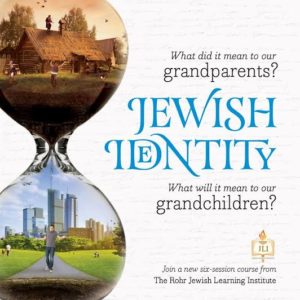 Truth comes in paradox (ask me why another time, I’ll be glad to get into it). Be that as it may, the core truths of our lives are often fraught with a certain tension as well. Self concept—how you view and perceive yourself—is one such truth; and if you’re Jewish this includes what your Jewish identity means to you.
Truth comes in paradox (ask me why another time, I’ll be glad to get into it). Be that as it may, the core truths of our lives are often fraught with a certain tension as well. Self concept—how you view and perceive yourself—is one such truth; and if you’re Jewish this includes what your Jewish identity means to you.
On the one hand, can there be anything easier than being a Jew in the free world? The blessings of autonomy, prosperity and security which the modern era affords the majority of Jews are historically unprecedented.
On the other hand, can there be anything more difficult than being a Jew in the free world? The alluring calls of secularism, materialism and assimilation which beckon today’s Jews are challenges previous generations did not have to grapple with (to the degree we must today).
Indeed, it is the best of times; it is the worst of times. The very thing we love, the liberty which empowers us is also our Achilles heel.
Indeed, what does it mean to be a Jew? For six million in 1930‘s Europe it meant to be slaughtered indiscriminately because their passport was stamped with the fateful word: Jude. For Daniel Pearl in 2002, it meant being beheaded by Pakistani terrorists because “My father’s Jewish, my mother’s Jewish, I’m Jewish.”
It’s not all doom and gloom though, at least not any more (thank G-d).
In 1965 it meant not pitching in the opening game of the World Series for Dodgers ace pitcher Sandy Koufax. Koufax was not particularly observant, but in his own words: “There was never any decision to make … because there was never any possibility that I would pitch. Yom Kippur is the holiest day of the Jewish religion. The club knows that I don’t work that day.” Last year, 2013, it meant an 11 year old girl, a table-tennis star, forwent competing in the national finals because, to paraphrase the iconic Walter: she doesn’t spin on Shabbos. Just last week Aaron Liberman made his fellow MOTs kvell when he proudly sported a Kipah, the first Big Ten player to ever wear a yarmulke during a game.
But perhaps these are externalities, superficial expressions of auspicious circumstance. What then lies at its core, what is its essence?
A recent online quiz on Jewish identity (about food – surprise!) had the following introduction: Let’s face it: At some point, you’ve discussed your Jewish identity, or lack thereof. You have explained, justified, wrangled with, or laughed at your religious and ethnic identity, and how it relates to American society. And let’s face it, you ended up every time in the same place: Entrenched positions and hackneyed categories.
Word.
A recent PEW study revealed that 22% of Jews identify as ‘Jews with no religion’. Or as comedian Sarah Silverman put it: “I am Jewish, but I’m totally not.” For many, this is a clear indication that the landscape of Jewish identity is changing rapidly. It is high time to initiate the discussion about Jewish identity, what it means, why it is still relevant, and what we can do to make it something our children and grandchildren will cherish for generations to come.
To be a Jew in the Free World, the winter offering of the Jewish Learning Institute, addresses just these issues.
We will confront questions of allegiance and issues in which Judaism and contemporary society appear to be in conflict. Looking into the past, the course explores a series of fascinating case studies, such as arguments made in the 1650s to convince Oliver Cromwell to readmit Jews to England, and how Ulysses S. Grant’s 1862 expulsion of the Jews became a defining issue in his presidential election.
To be a Jew in the Free World is unique in that it will likely represent the first nationwide effort to bring the Jewish community together to address these important issues since the findings of the PEW report were released in October of 2013.
Like all JLI programs, To Be a Jew in the Free World is designed to appeal to people at all levels of Jewish knowledge, including those without any prior experience or background in Jewish learning. All JLI courses are open to the public, and attendees need not be affiliated with a particular synagogue, temple, or other house of worship.
Interested students may call 651-998-9298, email [email protected] or visit www.spchabad.com/JLI. for registration and other course-related information. JLI courses are presented in St. Paul in partnership with the St. Paul JCC.

